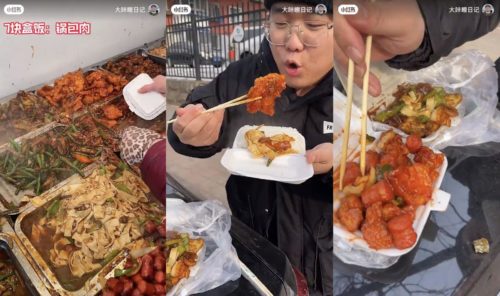Iconic Tianjin eatery chain catches heat for threatening to sue customer
Goubuli (狗不理 gǒubúlǐ), a Tianjin-based eatery chain that has been in business for more than 150 years, is facing fresh questions over its integrity as it attempts to suppress critical feedback from a disgruntled customer.

Goubuli (狗不理 gǒubúlǐ) is a Tianjin-based eatery chain that has been in business for more than 150 years, and is famous for its steamed stuffed buns. The company has long been struggling to restore its reputation after numerous complaints about food quality over the years. Now, the iconic brand is facing fresh questions over its integrity as it attempts to suppress critical feedback from a disgruntled customer.
The scathing review that sent Goubuli over the edge was made by a travel blogger named Gǔ Yuè 谷岳. On September 8, Gu shared a video (in Chinese) with his 1.7 million followers on Weibo, in which he visited a Goubuli branch in Beijing and gave his honest opinion on several items on the menu. Titled “The worst reviewed restaurant on Dazhong Dianping,” the video’s caption explains that Gu decided to patronize the location because he wanted to show viewers “how bad this restaurant really is.”
And to pretty much no one’s surprise, the results were profoundly disappointing.
“This thing is full of fatty meat. So greasy. The filling is too skimpy,” Gu said after tasting the brand’s signature dish, steamed pork buns. Unable to finish the food due to its “astonishingly high level of greasiness,” Gu concluded the video by saying that his biggest gripe with the restaurant was not its mediocre baozi (包子 bāozi) or indifferent service, but how it priced its food. “These buns are worth no more than 20 yuan ($2.94),” Gu commented on the two baskets of baozi he ordered, which cost him 100 yuan ($14.68) in total.
It took no time for Gu’s review to go viral, as hundreds of thousands of people used his video as an outlet to air their grievances about what they called “the most overrated tourist trap in Tianjin.” As of today, the clip has racked up more than 120 million views and nearly 85,000 likes on Weibo.
“I’ve had Goubuli baozi in Tianjin. Nothing was memorable about it except that it was unreasonably expensive. It baffles me that the business finds no problem with its pricing,” a Weibo user wrote.
The backlash against Goubuli intensified on September 10 when the company decided to declare a war against critics. In a since-deleted statement (in Chinese), Goubuli accused Gu of publishing “false” and “defamatory” statements about the company that have harmed its reputation. The eatery chain also said that it had reported the matter to the police and would press legal action against Gu if he refused to delete the video and issue a public apology.
Predictably, Goubuli’s aggressive approach to negative criticism has led to another firestorm of outrage on Chinese social media, with many people accusing it of threatening consumers who exercise their rights to make complaints.
“Everyone knows your food is gross. The controversy would have subsided had you stayed silent. Now you are known for not only disgusting food, but also bad attitude. I am counting the days until you go out of business,” a Weibo user commented (in Chinese).
In an interview over the weekend, Gu said that he found the statement threatening but was standing by his opinion. “I still think Goubuli is a valuable brand and I genuinely hope it will make better food and improve its service in the future,” Gu said (in Chinese).
As a century-old establishment that’s synonymous with Tianjin, Goubuli’s name is a moniker given to its founder Gāo Guìyǒu 高贵友, who set up his first shop specialising in selling stuffed baozi in 1858. As the restaurant gained popularity among locals, Gou quickly became too preoccupied with his business to chat with his customers, prompting people to call him “Goubuli,” which literally translates to “Gou won’t pay attention to you,” a word play on Gao’s nickname gǒuzǐ 狗子.
Despite Goubuli’s celebrated past and its importance to Tianjin’s food scene, the brand has largely lost the appeal it once had due to its declining food quality. Customers have voted with their feet, and this has resulted in a considerable plummet in its business.
According to Sanyan Finance (in Chinese), in the past few years, Goubuli shuttered over 10 branches in Beijing as business slumped. For the two last-standing stores in the capital, one has nearly 5,400 negative reviews on Dazhong Dianping. And of the 2,222 comments on the other Beijing branch, over 60 percent of them are tepid reviews with one-star ratings.
As one of China’s Time-honored Brands (中华老字号 zhōnghuálǎozìhào) — a title given by the Ministry of Commerce to long-established Chinese enterprises that have existed for centuries, Goubuli’s challenges and problems are representative of many other old Chinese brands. According to the Beijing News (in Chinese), of 1,128 companies that have the honorable title, over half of them are unable to turn a profit. Among people polled by the newspaper, over 60 percent of them thought brands like Goubuli and Quanjude (全聚德 quánjùdé), Beijing’s world-famous roast duck restaurant chain, were “obsolete” and “had no appeal to young customers.”






